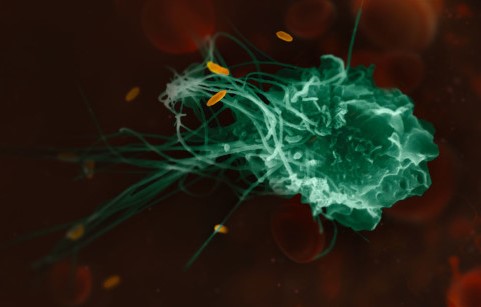
When we think about the immune system, B cells and T cells are often the focus of attention. B cells are known for producing antibodies, and T cells are celebrated for their cytotoxic capabilities. More recently, however, macrophages are being brought into the spotlight and recognized for their integral role in immune defense and the field of biologic drug development.
Macrophages and their sister cells, monocytes and dendritic cells, are essential immune cells that predominantly reside in organ tissues, including the liver, lung, and skin. As highlighted in a recent study, macrophages numbers are relatively small, comprising only around 10% of all immune cells but account for almost 50% of the total mass of all immune cells, highlighting their importance in immunity. These cells form the first line of defense against threats, such as pathogens or cancer cells.
However, not only are macrophages the immune system’s first responders, but they also help orchestrate B cell and T cell responses. This dual role allows them to act as a crucial bridge between innate and adaptive immunity. Essentially, macrophages drive the entire immune response, orchestrating complex interactions among different immune cells.
The biologics drug industry is now acknowledging the critical role of macrophages, harnessing their power to develop more effective antibody drugs. The most common antibody subclass, IgG, is divided into four types: IgG1, IgG2, IgG3, and IgG4, with IgG1 being the dominant type. Importantly, macrophages but not T cell or B cells, express Fcγ receptors on the cell surface that recognize and bind to IgG1 antibodies. Antibody-engagement activates macrophages to mediate phagocytosis, in which macrophages ingest and kill the IgG-coated pathogen. In fact, without macrophages, most antibody therapies would not work! Therefore, macrophages are truly the unsung heroes that drive the therapeutic effect of most existing antibody drugs.
Macrophages also play a key role in cancer treatments involving immune checkpoint blockade, such as the monoclonal antibody drug Ipilimumab. Ipilimumab works by targeting a protein called CTLA-4, found on the surface of T cells. CTLA-4 acts as an “off switch” for the immune system. When CTLA-4 binds to ligands on antigen-presenting cells, it sends inhibitory signals to T cells, reducing their activity and proliferation. Ipilimumab binds to CTLA-4, blocking its interaction with ligands. This blockade prevents the inhibitory signal, thereby taking the brake off of T cells, allowing them to remain active and fight against cancer cells. Here again, however, macrophages are the real heroes. Ipilimumab also binds to CTLA-4 on regulatory T cells (Tregs), which are known to suppress immune responses. The binding triggers macrophages to deplete Tregs through phagocytosis, resulting in an enhanced anti-tumor immune response. This action underscores the pivotal role of macrophages in modulating immune responses, particularly in the context of antibody treatments.
Pharmaceutical companies are now exploring ways to better exploit macrophages for cancer drug development. For example, macrophages express Toll-like receptors (TLRs) which bind to ligands that trigger signaling pathways resulting in macrophage activation, thus enhancing anti-tumor immune responses. TLR agonists could therefore be used as potential drugs to supercharge macrophage activity. To support the development of drugs targeting macrophages, Promega has developed various bioassays that can quickly evaluate the potency and stability of candidate drugs.
Although in the past macrophages have often been overlooked, they are essential to the effective functioning of our immune system. From direct pathogen or tumor cell destruction to facilitating other immune cells’ functions, macrophages are the unsung heroes in our ongoing battle against diseases. Understanding and harnessing their capabilities could open new avenues in immunotherapy and biologic treatments.
Learn more about the role of macrophages in biologic drug development in this video:
Learn more about our bioassays for evaluating drugs targeting macrophages.
Latest posts by Johanna Lee (see all)
- Can AI Replace High-Throughput Screens for Drug Discovery? - April 30, 2024
- How Avian Influenza Crosses Species - February 22, 2024
- Macrophages: The Unsung Heroes of Immune Response and Biologic Drug Development - December 28, 2023
